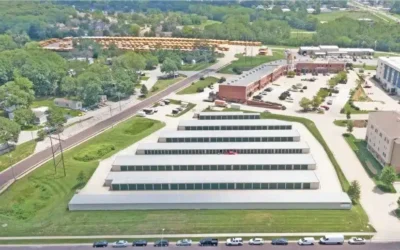The coronavirus pandemic has brought the economy to a halt and made it difficult for first-time business owners to find the financing they need to get started.
The self-storage industry is not immune to the world’s economic woes, but that doesn’t mean that first-time self-storage investors can’t find the financing they need to enter into the industry. Financing is still available for first-time self-storage owners who are proactive and follow the right steps. Here are a few tips to help you break into the self-storage market.
Identify your market
The self-storage industry has been resilient despite the recession which means that new markets are still out there and they are waiting for savvy business owners to find them. The first thing any prospective self-storage facility owner must do is identify their market.
What are you going to bring to the area that your competitors will not? What makes your facility unique? Uniqueness can be anything from bigger storage units to a cleaner facility you just need to find the thing that makes you stand out from the competition and entices investors. Conduct a market study and learn the tangible and intangible factors that drive the self-storage market in your area.
Create viability
Viability is key to getting funding for your self-storage facility. In order for your business to take off, you are going to have to show investors that you have financial and municipal viability. Financial viability is straightforward. That means you have done your market study and have the financial wherewithal to start a business. This means you have shown your investors that your self-storage facility has the cash flow to withstand any financial bumps in the road.
Municipal viability means your local city or county supports the concept of your project and believes it is realistic. This means taking your idea to your local city planner and making sure your facility is up to local code. You can ensure your building will be approved by hiring a qualified and local engineer, architect and zoning lawyer who knows what can get approved in your area. Hiring a good team is key to ensuring municipal viability.
Hire experience
You are trying to start your first self-storage facility which means you lack the experience that would entice lenders to work with you. However just because you don’t have any experience does not mean you can’t work with people who do. Surround yourself with a team of experts who can help you manage the process of starting your self-storage business.
This can mean contracting with an experienced construction company, hiring someone with self-storage management experience, or finding a business partner with experience. Pay the right people to help you through every process and you will put lender worries at ease.
Identify the right loan
Find out what type of loan is best for you. Are you going to do a conventional loan or does it make more sense to go the SBA route? A conventional loan will require you to put down 30% to 35% of the project upfront while an SBA loan will require you to put around 15% down. The SBA has two programs, which are the 504 loan and the 7a.
- The 504 provides two loans, which are a first deed of trust and a second deed of trust. The first loan is with a local bank and they will finance 50% of the project cost. The SBA, or the CDC, will offer the other 35% in the form of a second deed of trust. If the project is new construction, then the bank will fund the whole amount during construction. When you have the C of O, then the ratios will go back to 50% to the bank, 35% to the CDC and your 15% equity. The benefits of this program include lower fees and long term fixed rates.
- The 7a is one loan and will be a 25 year amortization and never balloons. They again will finance up to 85% of the total project cost. Rates can range anywhere from floating to a fixed up to 25 years. Fees are going to range from 3% to 3.5% for this loan. These loans do have a 5,3,1 prepayment penalty. The benefits of this program include one loan and flexibility with the prepayment penalty.
If you are trying to become a first-time self-storage owner it is possible to find financing despite the recession. As long as you have established a solid plan and strong support structure you can find a lender that will help you start your business.
David Kotter is the Principal of Integrity Capital LLC, a commercial mortgage brokerage in Scottsdale Arizona. For further information, please contact David Kotter at [email protected] or 480-219-1205.







